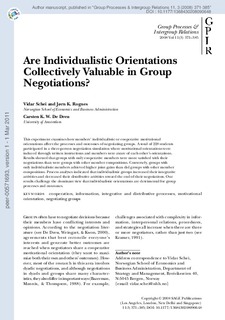Are individualistic orientations collectively valuable in group negotiations?
Journal article, Peer reviewed
Permanent lenke
http://hdl.handle.net/11250/298004Utgivelsesdato
2008Metadata
Vis full innførselSamlinger
- Articles (SOL) [143]
Sammendrag
This experiment examines how members' individualistic or cooperative motivational orientations affect the processes and outcomes of negotiating groups. A total of 228 students participated in a three-person negotiation simulation where motivational orientations were induced through written instructions and members were aware of each other's orientations. Results showed that groups with only cooperative members were more satisfied with their negotiations than were groups with other member compositions. Conversely, groups with only individualistic members achieved higher joint gains than did groups with other member compositions. Process analyses indicated that individualistic groups increased their integrative activities and decreased their distributive activities toward the end of their negotiations. Our results challenge the dominant view that individualistic orientations are detrimental for group processes and outcomes.
Beskrivelse
-Author manuscript, published in "Group Processes & Intergroup Relations 11,3(2008) 371-385" Copyright © 2008 by SAGE Publications
